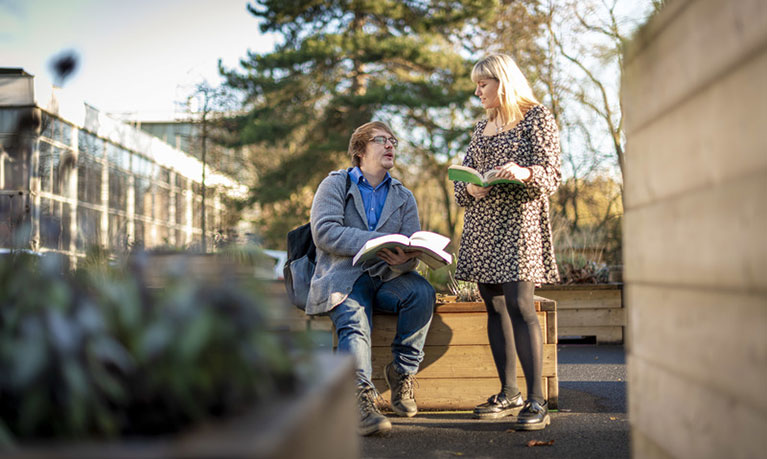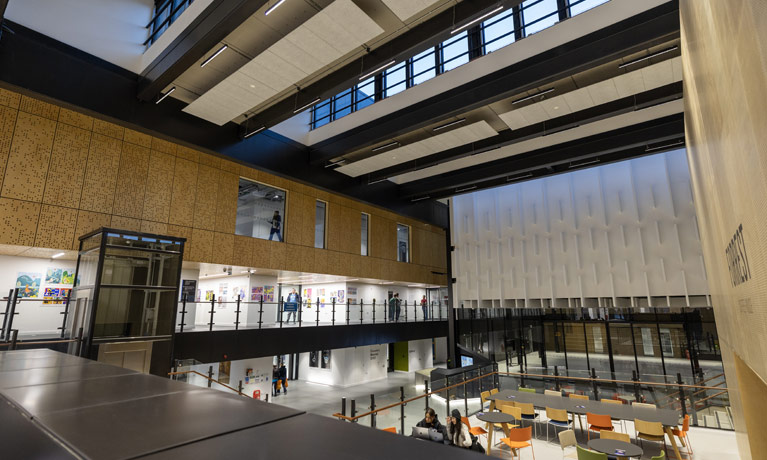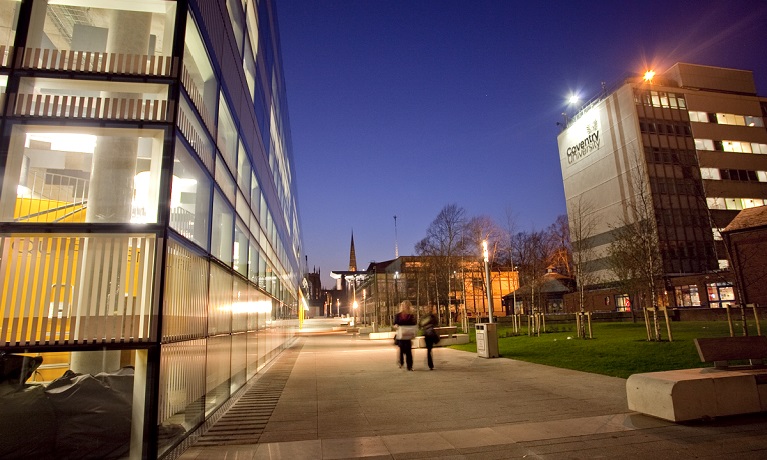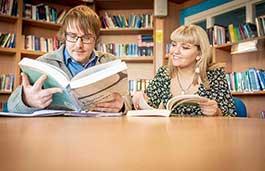Search
English Literature BA (Hons)
Study level: Undergraduate
Embrace the complexity of writers and other creators, investigating not just novels and poetry but also images and film, pamphlets, speeches, graphic novels and games, drama and memes.
Year of entry
Location
Coventry University (Coventry)
Study mode
Full-time
Sandwich
Duration
3 years full-time
4 years sandwich
Course code
Q311
Start date
September 2026
The information on this page is for 2025-26 entry and should be used as guidance for 2026-27 entry. Please keep checking back on this course page to see our latest updates.
Course overview
Examine classic and contemporary works and encounter diverse voices. Develop the critical thinking, analytical and communication skills needed to prepare for a range of careers.
Key course aims
- Dive into diverse literature: explore a range of texts and topics and delve into traditional works like Romanticism and Shakespeare. Venture into the unusual with ghost stories and science fiction, and engage with innovative subjects such as environmentalism, performativity, gender and race studies. From local tales of the Midlands to Anglophone literature from around the world, this course offers a rich and dynamic literary journey.
- Skills-focused: develop your critical thinking and the ability to communicate your ideas effectively in written, verbal and visual formats—all of which are assets for a range of careers.
- Choose your path: customise your assessments in both topic and format, allowing you to present your work in ways that align with your interests and strengths.
Rated Gold Overall
Teaching Excellence Framework (TEF) 20235 QS Stars for Teaching and Facilities
QS Stars University RatingsTop 5 Student City in England (Coventry)
QS Best Student Cities Index 2025Why you should study this course
- Contemporary curriculum: whether you’re passionate about poetry, novels, film or any other genre, you’ll join a lively learning community to explore topics such as: what makes characters and settings strange in Gothic and speculative fiction; how writers dealt with changes in the environment from the Industrial Revolution in the Romantic period to climate change today; ways that filmmakers have constructed characters and places; and how activists have used words and stories to call for their rights during the Enlightenment, the Victorian era and now.
- Project-based learning: we empower you to actively engage in real-world, meaningful projects. Work on complex problems, create tangible solutions and develop essential skills such as critical thinking, collaboration and communication. Assessments are designed to replicate the type of work and tasks carried out by English literature graduates. You could find yourself producing industry-ready portfolios, video presentations, podcasts, reflective and critical writing, documentaries, proposals, news articles, community projects and visual presentations that showcase your expertise and real-world readiness.
- Beyond the classroom: explore literature in various settings, not just the traditional classroom. The learning environment will be varied, ranging from digitally immersive spaces to local museums.2 Expect lively discussions and group activities, learning from multiple subject experts to gain diverse perspectives.
- Academic community: join a community of lecturers and students who are passionate about sharing experiences and ideas on the complexity of all literature and media, and what they mean to communities today.
We create, read and tell stories to connect with others. The study of English literature is fundamental to understanding, interpreting and explaining these stories. So, learning how to read and write about stories across time and cultures gives you the ability to comprehend and communicate a multitude of ideas and concepts in a range of circumstances. These analytical and communication skills are applicable across a number of jobs and our students have gone on to work in TV and video game media, politics, social policy, education and marketing.
Katja Pilhuj, Course Director, BA English Literature, quoted in 2024

What you'll study
This course has a common first year.
The common first year enables you to work alongside students doing similar courses to you, to widen your knowledge and exposure to other subject areas and professions. You will have the opportunity to collaborate with other students, so you can share your insights and experience which will help you to develop and learn.
If you discover an interest in a specific subject you have studied, upon successful completion of your first year, you could swap degrees with another course in your common first year (subject to meeting progression requirements).
Common first year courses
- English Literature BA (Hons)
- English Literature and Creative Writing BA (Hons)
- Philosophy BA (Hons)
We regularly review our course content, to make it relevant and current for the benefit of our students. For these reasons, course modules may be updated.
How you'll learn
In this course, you'll learn through hands-on activities and real-world examples, using the same approaches professionals use in the field. It’s all about helping you build the skills you need to feel confident and prepared for your future career.
Teaching methods may include:
- seminars and workshops with real-time feedback and support from lecturers and peers
- project work that can include script development, short film and podcasts
- immersive and interactive games that you could solve with critical thinking
- visits to local historical and cultural sites2
- experiences and knowledge in more than one discipline with shared creative writing and literature modules
- opportunities for one-to-one tutorials. These are only a few of the teaching activities in which you can participate. We can also work with you to identify your interests and passions and find ways to integrate those into classes and assessments.
These are only a few of the teaching activities in which you can participate. We can also work with you to identify your interests and passions and find ways to integrate those into classes and assessments.
Teaching contact hours
We understand that everyone learns differently, so each of our courses will consist of structured teaching sessions, which can include:
- on campus lectures, seminars and workshops
- group work
- self-directed learning
- work placement opportunities2.
As a full-time undergraduate student, you will study modules totalling 120 credits each academic year. A typical 20 credit module requires a total of 200 hours study. This is made up of teaching contact hours, guided and independent study.
Teaching hours:
Teaching hours vary each semester, year of study and due to module selection. During your first year you can expect 15-18 teaching hours each week. You will also have the option to attend optional sessions including time with a progress coach or to meet with staff for advice and feedback. As you progress through your studies, teaching hours may reduce.
Guided and independent study:
Throughout your studies, you will be expected to spend time in guided and independent study to make up the required study hours per module. You’ll be digging deeper into topics, review what you’ve learned and complete assignments. This can be completed around your personal commitments. As you progress through your studies, you’ll spend more time in independent study.
Online learning:
As an innovative university, we use different teaching methods including online tools and emerging technologies. So, some of your teaching hours and assessments may be delivered online.
Assessment
This course incorporates new and innovative assessment methods aligned with current industry standards, providing you with practical, real-world skills designed to advance your professional readiness and career prospects.
Assessment methods may include:
- essays: both critical and creative
- podcasts
- movie and theatre scripts
- short documentaries and films
- presentations
- game narratives and live-action interactive experiences
- media articles like reviews, guides and personal experience.
The Coventry University Group assessment strategy ensures that our courses are fairly assessed and allows us to monitor student progression towards achieving the intended learning outcomes.
International experience opportunities
This course has a multicultural and international outlook, and we use a range of international texts and authors.
You have the opportunity to undertake a Study Abroad Year or International Placement Year after successful completion of two years of study2.
Please note that all international experience opportunities may be subject to additional costs, competitive application, availability, and meeting applicable visa and travel requirements, and are therefore not guaranteed2.
Studying at Coventry University has been an incredible experience. I have acquired many useful skills and expertise, made remarkable connections and enjoyed myself immensely. The professors have been very forthcoming in providing help and counsel during my studies.
Aksshat Goel, First year English Literature BA (Hons) student, April 2022

Entry requirements
Typical entry requirements:
Fees and funding
| Student | Full-time | Part-time |
|---|---|---|
| UK, Ireland*, Channel Islands or Isle of Man | 2026/27 fees TBC 2025/26 fees: £9,535 per year |
Request fee information |
| EU | 2026/27 fees TBC 2025/26 fees: £9,535 per year with EU Support Bursary** 2026/27 fees TBC 2025/26 fees: £16,800 per year without EU Support Bursary** |
Not available |
| International | 2026/27 fees TBC 2025/26 fees: £16,800 per year |
Not available |
If you choose to study this course with a professional placement2 or study abroad year, you will need to pay a tuition fee3 to cover your academic support throughout your placement year. Students commencing their professional placement in the academic year 2027/28 will pay £1,500 if they are paying UK fees, or £1,800 if they are paying international fees.
For advice and guidance on tuition fees and student loans visit our Undergraduate Finance page and see The University’s Tuition Fee and Refund Terms and Conditions.
The University will charge the tuition fees that are stated in the above table for the first Academic Year of study. The University will review tuition fees each year. For UK (home) students, if Parliament permits an increase in tuition fees, the university may increase fees for each subsequent year of study in line with any such changes. Note that any increase is expected to be in line with inflation.
If you choose to study this course with a professional placement, the University will charge the tuition fees stated above for those on a placement during Academic Year 2027/28. The University will review professional placement tuition fees each year. For UK (home) students, the University may increase fees for each subsequent year of study, but such that it will be no more than 5% above inflation.
For international students, we may increase fees each year, but such increases will be no more than 5% above inflation. If you defer your course start date or have to extend your studies beyond the normal duration of the course (e.g. to repeat a year or resit examinations) the University reserves the right to charge you fees at a higher rate and/or in accordance with any legislative changes during the additional period of study.
We offer a range of International scholarships to students all over the world. For more information, visit our International Scholarships page.
Tuition fees cover the cost of your teaching, assessments, facilities and support services. There may be additional costs not covered by this fee such as accommodation and living costs, recommended reading books, stationery, printing and re-assessments should you need them. Find out what's included in your tuition costs.
The following are additional costs not included in the tuition fees:
- Any optional overseas field trips or visits: £400+ per trip.
- Any costs associated with securing, attending or completing a placement (whether in the UK or abroad).
*Irish student fees
The rights of Irish residents to study in the UK are preserved under the Common Travel Area arrangement. If you are an Irish student and meet the residency criteria, you can study in England, pay the same level of tuition fees as English students and utilise the Tuition Fee Loan.
**EU Support Bursary
Following the UK's exit from the European Union, we are offering financial support to all eligible EU students who wish to study an undergraduate or a postgraduate degree with us full-time. This bursary will be used to offset the cost of your tuition fees to bring them in line with that of UK students. Students studying a degree with a foundation year with us are not eligible for the bursary.
Facilities
You will benefit from studying on our well-equipped, modern campus4.

Delia Derbyshire Building
The Delia Derbyshire complex offers more space to learn, design and make, including a hyper-studio for students across all disciplines to collaborate on projects together, a gallery space and an events atrium.

The Library
The library is open 24/7, 364 days a year. It’s where you can access your course’s specialist Academic Liaison Librarian. It’s also home to specialist teams which can support you with your academic writing and maths and statistics questions.

George Eliot building
Named after one of the leading writers of the Victorian age, the George Eliot building is the city centre home of English studies at Coventry University. Mingle with like minded students, cross the Edible Garden campus to relax at the Hub, or take the few minutes walk to immerse yourself in books at the Lanchester library.
Facilities are subject to availability. Access to some facilities (including some teaching and learning spaces) may vary from those advertised and/or may have reduced availability or restrictions where the university is following public authority guidance, decisions or orders.
Careers and opportunities
Throughout the course, your academic study will be combined with skills development in a range of areas highly valued by many types of employers. You will have the opportunity to refine your critical thinking and analysis in both written and spoken formats, improving your reading and listening ability to communicate and present ideas.
On successful completion of the course, you should be a graduate with a firm sense of global cultural diversity, ready to make a dynamic difference anywhere in the world. You could find yourself working in the following roles:
- Educator
- Book/magazine editor
- Postgraduate student
- Public relations specialist
- Marketing content writer
- Researcher
- Non-profit manager
- Archivist/museum curator.
The graduate destinations listed above illustrate potential career paths. You may need to gain additional qualifications or practical experience, pass professional examinations, complete training, cover associated costs and meet specific visa or immigration requirements to secure employment in these fields.
Further study
You can choose to continue your studies at Coventry University with the English Literature MA. You may be entitled to an alumni discount on your fees if you decide to extend your time with us by progressing from undergraduate to postgraduate study.

Discover Phoenix+
Phoenix+ brings you together with other students to learn, experience and develop essential knowledge and skills. Whatever destination you choose, it's about preparing you for life after university.
Learn more about Phoenix+How to apply
You may also like






